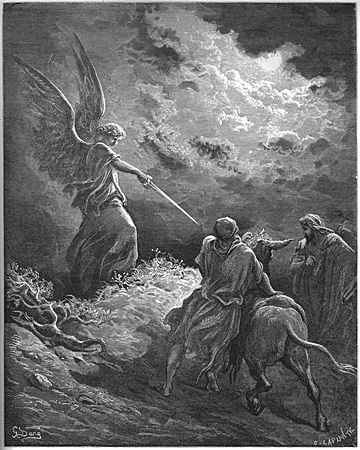Petri Ii 2
1 Fuerunt vero et pseudoprophetæ in populo, sicut et in vobis erunt magistri mendaces, qui introducent sectas perditionis: et eum qui emit eos, Dominum negant, superducentes sibi celerem perditionem.
But false prophets also arose amongst the people, as false teachers will also be amongst you, who will secretly bring in destructive heresies, denying even the Master who bought them, bringing on themselves swift destruction.
2 Et multi sequentur eorum luxurias, per quos via veritatis blasphemabitur:
Many will follow their immoral ways, and as a result, the way of the truth will be maligned.
3 et in avaritia fictis verbis de vobis negotiabuntur: quibus judicium jam olim non cessat: et perditio eorum non dormitat.
In covetousness they will exploit you with deceptive words: whose sentence now from of old doesn’t linger, and their destruction will not slumber.
4 Si enim Deus angelis peccantibus non pepercit, sed rudentibus inferni detractos in tartarum tradidit cruciandos, in judicium reservari. (Tartaroō g5020)
For if God didn’t spare angels when they sinned, but cast them down to Tartarus, and committed them to pits of darkness to be reserved for judgement; (Tartaroō g5020)
5 Et originali mundo non pepercit, sed octavum Noë justitiæ præconem custodivit, diluvium mundo impiorum inducens.
and didn’t spare the ancient world, but preserved Noah with seven others, a proclaimer of righteousness, when he brought a flood on the world of the ungodly,
6 Et civitates Sodomorum et Gomorrhæorum in cinerem redigens, eversione damnavit: exemplum eorum, qui impie acturi sunt, ponens:
and turning the cities of Sodom and Gomorrah into ashes, condemned them to destruction, having made them an example to those who would live in an ungodly way,
7 et justum Lot oppressum a nefandorum injuria, ac luxuriosa conversatione eripuit:
and delivered righteous Lot, who was very distressed by the lustful life of the wicked
8 aspectu enim, et auditu justus erat: habitans apud eos, qui de die in diem animam justam iniquis operibus cruciabant.
(for that righteous man dwelling amongst them was tormented in his righteous soul from day to day with seeing and hearing lawless deeds),
9 Novit Dominus pios de tentatione eripere: iniquos vero in diem judicii reservare cruciandos.
then the Lord knows how to deliver the godly out of temptation and to keep the unrighteous under punishment for the day of judgement,
10 Magis autem eos, qui post carnem in concupiscentia immunditiæ ambulant, dominationemque contemnunt, audaces, sibi placentes, sectas non metuunt introducere blasphemantes:
but chiefly those who walk after the flesh in the lust of defilement and despise authority. Daring, self-willed, they are not afraid to speak evil of dignitaries,
11 ubi angeli fortitudine, et virtute cum sint majores, non portant adversum se execrabile judicium.
whereas angels, though greater in might and power, don’t bring a slanderous judgement against them before the Lord.
12 Hi vero velut irrationabilia pecora, naturaliter in captionem, et in perniciem in his quæ ignorant blasphemantes in corruptione sua peribunt,
But these, as unreasoning creatures, born natural animals to be taken and destroyed, speaking evil in matters about which they are ignorant, will in their destroying surely be destroyed,
13 percipientes mercedem injustitiæ, voluptatem existimantes diei delicias: coinquinationes, et maculæ deliciis affluentes, in conviviis suis luxuriantes vobiscum,
receiving the wages of unrighteousness; people who count it pleasure to revel in the daytime, spots and defects, revelling in their deceit while they feast with you;
14 oculos habentes plenos adulterii, et incessabilis delicti. Pellicientes animas instabiles, cor exercitatum avaritia habentes, maledictionis filii:
having eyes full of adultery, and who can’t cease from sin, enticing unsettled souls, having a heart trained in greed, accursed children!
15 derelinquentes rectam viam erraverunt, secuti viam Balaam ex Bosor, qui mercedem iniquitatis amavit:
Forsaking the right way, they went astray, having followed the way of Balaam the son of Beor, who loved the wages of wrongdoing;
16 correptionem vero habuit suæ vesaniæ: subjugale mutum animal, hominis voce loquens, prohibuit prophetæ insipientiam.
but he was rebuked for his own disobedience. A speechless donkey spoke with a man’s voice and stopped the madness of the prophet.
17 Hi sunt fontes sine aqua, et nebulæ turbinibus exagitatæ, quibus caligo tenebrarum reservatur.
These are wells without water, clouds driven by a storm, for whom the blackness of darkness has been reserved forever. (questioned)
18 Superba enim vanitatis loquentes, pelliciunt in desideriis carnis luxuriæ eos, qui paululum effugiunt, qui in errore conversantur:
For, uttering great swelling words of emptiness, they entice in the lusts of the flesh, by licentiousness, those who are indeed escaping from those who live in error;
19 libertatem illis promittentes, cum ipsi servi sint corruptionem: a quo enim quis superatus est, hujus et servus est.
promising them liberty, while they themselves are bondservants of corruption; for a man is brought into bondage by whoever overcomes him.
20 Si enim refugientes coinquinationes mundi in cognitione Domini nostri, et Salvatoris Jesu Christi, his rursus implicati superantur: facta sunt eis posteriora deteriora prioribus.
For if, after they have escaped the defilement of the world through the knowledge of the Lord and Saviour Yeshua the Messiah, they are again entangled in it and overcome, the last state has become worse for them than the first.
21 Melius enim erat illis non cognoscere viam justitiæ, quam post agnitionem, retrorsum converti ab eo, quod illis traditum est, sancto mandato.
For it would be better for them not to have known the way of righteousness, than after knowing it, to turn back from the holy commandment delivered to them.
22 Contigit enim eis illud veri proverbii: Canis reversus ad suum vomitum: et, Sus lota in volutabro luti.
But it has happened to them according to the true proverb, “The dog turns to his own vomit again,” and “the sow that has washed to wallowing in the mire.”





















